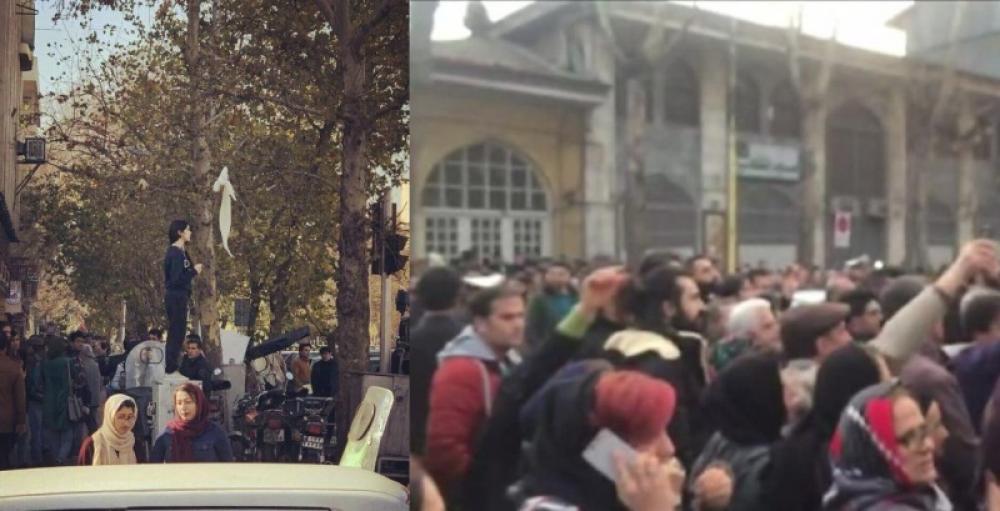Just Earth News | @justearthnews | 30 Dec 2017, 03:49 pm Print

Tehran, Dec 30 (JEN): Hit by a wave of anti-government protests for over two days, Iran has warned its citizens against illegal gatherings.
Interior Minister Abdolreza Rahmani-Fazli has told people "not to participate in these illegal gatherings as they will create problems for themselves and other citizens".
However, defying the official orders, small groups were seen protesting against the government at the Tehran University and other places.
According to a video circulated online, protesters are demanding a resignation from the country's supreme leader Ayatollah Ali Khamenei.
Protests have taken place in Mashad, Ghuchan, Kerman, Khoramabad, Khoramshahr, Shiraz, Zahedan, Neyshabur, Shahroud, Sanandaj, and Yazd...
— Maryam Namazie (@MaryamNamazie) December 29, 2017
Slogans include:
Death or freedom
Down with dictator
Down with Rouhani
Don't be afraid; we are all together
Political prisoners must be free https://t.co/88DJUiQewF
Slogans such as 'clerics act like God' were heard.
Protesters also blamed the government for rising prices in Iran and said that people have been 'forced to beg'.
Issues about Iran's constant meddling in other nation's interests were also brought up by demonstrators.
Where did it began?
It started in Mashhad, Iran's second most populous city and the capital of Razavi Khorasan Province.
What started as a small scale dissent by a group of people in Mashhad, on Thursday, soon spread to other cities too and later swept the nation.
Demonstrators took to the streets in the national capital Tehran, in Rasht, in the north, and Kermanshah, in the west.
Cities like Isfahan, Hamadan also witnessed anti-government sloganeering.
How did the government respond?
To curb the sting of the dissent, over 52 people were picked up by law enforcement officers, who accused the protesters of using harsh words against the country's President.
Meanwhile, First Vice-President of Iran, Eshaq Jahangiri said that the protests were of the opponent's making
According to state broadcaster IRIB, Jahangiri said, "Some incidents in the country these days are on the pretext of economic problems, but it seems there is something else behind them. They think by doing this they harm the government, but it will be others who ride the wave."
In addition, Iranian authorities also organised rallies, where thousands of pro-government demonstrators took part.
Local Reaction
Like always, the demonstrations have brought polarising views.
Some have called the demonstrations 'the biggest since 2009's pro-reform rallies'.
Supporting and egging the protesters, Maryam Rajavi, the leader of the People's Mujahedin of Iran, an organization trying to overthrow the Iranian government, tweeted, "This is the Iranian people’s great uprising to overthrow the mullahs’ oppressive and corrupt dictatorship."
This is the Iranian people’s great uprising to overthrow the mullahs’ oppressive and corrupt dictatorship.#Iran#Mashhad#Kermanshah
— Maryam Rajavi (@Maryam_Rajavi) December 29, 2017
State-run Channel One has slammed the protests as one designed and conceived to appease rival nations.
It said that through the demonstrations, "opportunists tried to make British, American and Saudi media happy with norm-breaking slogans'.
Trump's warning
US President Donald Trump, who is at loggerheads with Tehran, said in a tweet on Saturday morning, "Many reports of peaceful protests by Iranian citizens fed up with regime’s corruption & its squandering of the nation’s wealth to fund terrorism abroad. Iranian govt should respect their people’s rights, including right to express themselves. The world is watching! #IranProtests."
Many reports of peaceful protests by Iranian citizens fed up with regime’s corruption & its squandering of the nation’s wealth to fund terrorism abroad. Iranian govt should respect their people’s rights, including right to express themselves. The world is watching! #IranProtests
— Donald J. Trump (@realDonaldTrump) December 30, 2017
Trump's tweet can also be decoded as one from the US-Israel-Saudi Arabia nexus, which regularly slams the Iran-Lebanon camaraderie.
Saudi Arabia in the past has also accused Lebanon-based hardliners Hezbollah of running the country as Tehran's proxy.
A few months ago, tensions in the Middle East heightened after Lebanese Prime Minister Saad Hariri announced his resignation during a visit to Saudi Arabia.
Later, it triggered a blame game as both Lebanon and Iran said that Hariri must have done it due to external pressure from Riyadh.
- Foreign submarine attack? Iranian ship sinks close to Sri Lanka, over 100 missing: Reports
- US orders non-essential personnel out of Karachi, Lahore consulates over 'security risks'
- Carl Pei teases colourful surprise as Nothing Phone (4a) debuts at MW, check out the release date
- Apple unveils stunning new studio display XDR with 2000 Nits brightness and thunderbolt 5, check out the price
- Middle East conflict: Drone hits near US Consulate in Dubai, Massive fire erupts





-1763561110.jpg)
